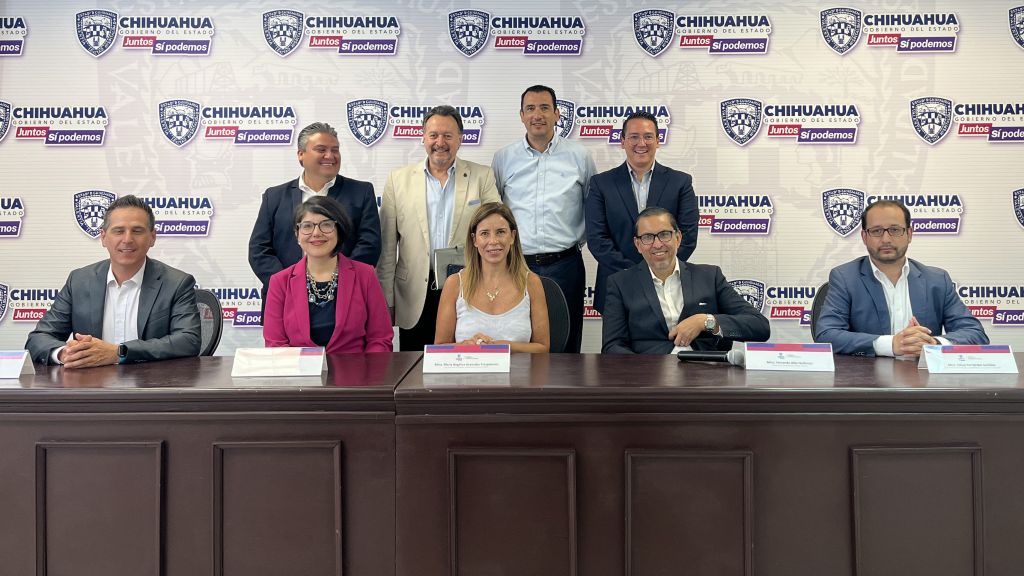Blog: What EVs Mean for LMICs
Wednesday, September 7, 2022
Energy + Mobility
Dedicated EV parking spots with chargers at the Technology Hub in Ciudad Juárez.
Our project with government and industry leaders in Chihuahua, Mexico is creating a roadmap for a strong e-mobility ecosystem
By Diana Páez and Dana Gorodetsky
Less than a year ago, we hosted a delegation from Chihuahua, Mexico here at WDI’s offices at the University of Michigan. The group included leaders in economic development, policy, manufacturing, workforce development, technology and engineering. Each had the same concern: How to prepare their region — an important automotive hub in the country — for an electric mobility (e-mobility) future.
In the time since this visit, momentum has continued to build — globally and especially in North America — around e-mobility. The transport sector is responsible for approximately one quarter of greenhouse gas emissions (GHG) globally, which brings serious consequences for climate change, according to the United Nations Industrial Development Organization. While the environmental benefits of EVs are still being debated, the industry shift toward electrification is clear. For countries with an established automotive manufacturing capability, shifting the industry toward producing EVs – while working to create the conditions for faster adoption — involves a significant cross-sector transformation.
At WDI, our mission is to provide economic decision makers with the tools of commercial success. And there’s no question that entering the EV market or transitioning products and services to serve EVs will require a robust toolkit.
As the mobility sector moves toward electrification, we are witnessing a shakeup in the relationship dynamics among traditional automotive players. Startups and tech companies are entering the market, dynamics between original equipment manufacturers (OEMs) and suppliers are changing, and former competitors are forming strategic partnerships to keep up. The landscape is shifting, resulting in blurred boundaries among industries and a broader, more dynamic mobility ecosystem.This disruption brings challenges as well as opportunities.
Markets for electric vehicles (EVs) are expanding quickly. Globally, almost 20 million passenger EVs are on the road. Policymakers around the world are increasing government targets for phasing out sales of new internal combustion vehicles. Meanwhile, new commitments by automakers are regularly announced, confirming that the strategic direction of most is to embrace EV production over the next decade. The 2020s will be a crucial decade for EV technology and the maturation of its value chain.
Diana Páez with government and business representatives after the press conference announcing the project in Ciudad Juárez, in August 2022. (From left to right, sitting, Raúl Varela, Director of Institute for Innovation and Competitiveness, María Angélica Granados Trespalacios, Secretary of Innovation and Economic Development of Chihuahua (SIDE), Fernando Alba, Under Secretary for Mining, Energy and Industry, and Ulises Fernández, Under Secretary for Innovation and Economic Development. From left to right, standing, Sergio Mancinas, Director of INADET, Jaime Campos, Industry Director at SIDE, René Chavira, Executive Director, Desarrollo Económico del Estado de Chihuahua, and Guillermo Alvarez, Executive Director, Chihuahua Futura.
This is why we at WDI are excited to partner with the State of Chihuahua to develop a roadmap that not only points out the challenges on the horizon, but also considers how companies and communities can flourish as a result of the transition.
In our recent visit to Chihuahua, we connected with more than 30 leaders from business, academia, government, and interest groups involved in the automotive and mobility sectors who shared about their work. Building on their insights and our research, we will identify key assets that the state of Chihuahua can leverage as well as gaps and challenges that will need to be addressed to navigate the transition to e-mobility. We will analyze these inputs across three key enablers: policy framework, infrastructure and workforce.
In addition, drawing from our business knowledge and global industry perspective, we will identify the most viable opportunities for businesses and entrepreneurs in Chihuahua to compete in the e-mobility value chain. The outcome of this collaboration will be a roadmap with concrete recommendations for players in Chihuahua to capture those opportunities, and specific actions that can lead to a stronger local ecosystem to enable this shift.
While the roadmap will be developed with Chihuahua’s assets and goals in mind, our work will be useful for players in other low and middle-income countries who are ready to create their own forward-looking strategy to take advantage of this major transition.

Dana Gorodetsky
Program Manager, Energy


